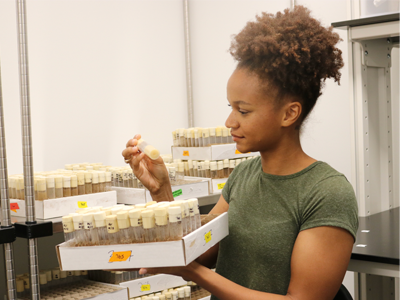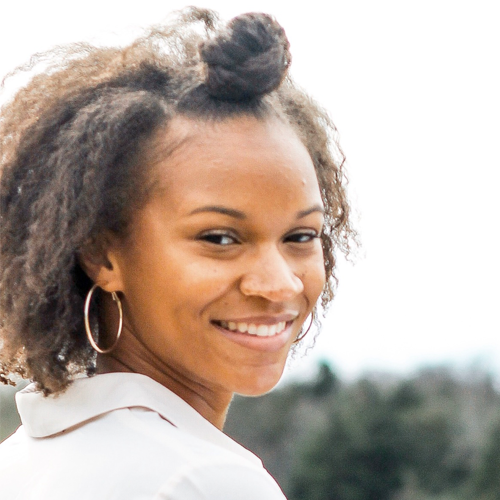Biosciences
Research Advisor: Julia Saltz
“Most of what I do is running a fly fight club because I just have flies fight, and other flies watch,” laughed Ecology and Evolutionary Biology graduate student Marina Hutchins from the Saltz lab. “We know that flies are actually smarter than what most humans may think they are; we know that they can see and remember an individual, for example. When a fight occurs, I’m looking at how audience members extract information from those encounters in order to inform their own future behavioral decisions.” Her two favorite fly combat sports are fencing, in which the flies sword fight with their slender legs, and boxing. The latter, she says, “Is exactly how it sounds. They rear up on their hind legs and with their front legs they are engaging each other. They can even throw each other to the ground. It can get crazy.”
 Hutchins loves using the unexpected drama and excitement of her research to draw people into science. “I’ve been involved with Rice STEM a lot, so I give talks to mostly K-12 students about my journey to graduate school, my research and what that looks like coming from a first-gen Black woman in academia,” she explained. “I like to show videos of the trials I’m conducting so that the students can actually see the flies fighting and engaging in these aggressive behaviors. I think there’s something innately interesting about behavioral research.”
Hutchins loves using the unexpected drama and excitement of her research to draw people into science. “I’ve been involved with Rice STEM a lot, so I give talks to mostly K-12 students about my journey to graduate school, my research and what that looks like coming from a first-gen Black woman in academia,” she explained. “I like to show videos of the trials I’m conducting so that the students can actually see the flies fighting and engaging in these aggressive behaviors. I think there’s something innately interesting about behavioral research.”
In addition to giving talks to large groups of students, Hutchins also has conducted longer-term mentorship. She initiated a partnership with community colleges in the area to help share her work through research opportunities for community college students. “My parents were both community college students, and I know there’s not a ton of opportunities for those students, so I’ve always had a really big interest in helping that population.” Normally, Hutchins leads a large team of undergraduate research assistants in the lab, but during the pandemic lockdown, she had to figure out how to make the experiments accessible remotely. She started recording her behavioral trials so that her students would be able to conduct remote research from anywhere, including from other colleges. “I then recruited two excellent students from branches of Lonestar Community College who worked with me beginning in the summer of 2019,” she continued. “They’re still working with me now.”
One of her students, Autumn, is now continuing her undergraduate education at Rice. “We spent a long time together working on her application, working on her statements. When she got the acceptance letter, she sent me a very joyous email that I still have in my inbox because it was just so special,” Hutchins said. “It was really cool to see her get into a prestigious school like Rice because of a research opportunity that really opened those doors and showed her that this was a school that she could attend.”
Hutchins hopes that her outreach and mentorship can help inspire students from groups and backgrounds traditionally underrepresented in STEM. She explained, “I think representation is really important for that, because it’s very difficult for someone to be what they can’t see. I try in all of my outreach opportunities to put myself out there as much as I can and to tell people that there are scientists that look like you doing really cool things.”
Someday, Hutchins hopes to become a professor so that she can spend the rest of her life teaching, mentoring and conducting research. “It’s really an inspiring goal because I can now imagine standing in front of a biology lecture hall and doing that same thing, that representation and teaching, but for hundreds of people at a time,” she said. “But also, outreach doesn’t always have to be really big to make a big difference. A lot of people forget the smaller, more involved and purposeful mentorship opportunities, but they’re a really important part of outreach. It’s not always fancy demonstrations or expensive equipment. Sometimes it’s just reaching out to the students who are already in your community who may need a little extra help.”

